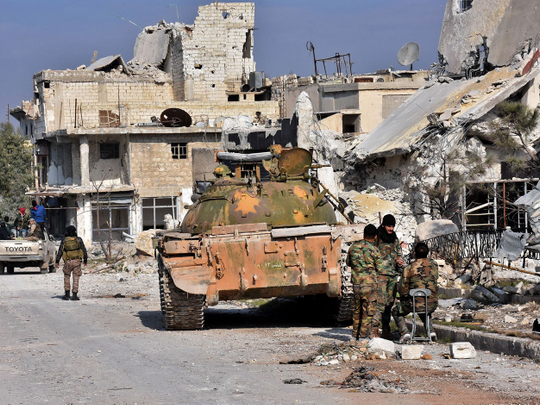
Dubai: Syrian rebels on Monday withdrew from six more neighbourhoods in their one-time bastion of east Aleppo in the face of advancing government troops, the Syrian Observatory for Human Rights said.
“The battle of Aleppo has reached its end. It is just a matter of a small period of time, no more, no less... it’s a total collapse,” said Rami Abdul Rahman, director of the Britain-based monitor.
Among the neighbourhoods from which rebels withdrew was Bustan Al Qasr, once one of the most fortified districts under opposition control.
The withdrawal leaves rebels confined to just a handful of neighbourhoods in the southeast of Aleppo, the largest of them Sukkari and Mashhad.
Syria’s army is on the verge of retaking all of east Aleppo - in rebel hands since 2012 - after almost four weeks of a sustained assault.
Chief opposition coordinator Riad Hijab said on Monday that defeat in Aleppo would not weaken the resolve of opponents of President Bashar Al Assad to remove him from power.
“If Al Assad and his allies think that a military advance in certain quarters of Aleppo will signify that we will make concessions, then (I say) that will not happen. We will not make any concessions,” Hijab told reporters after meeting French President Francois Hollande.
Accusing Al Assad’s forces of fleeing Palmyra like “rats” in the face of Daesh, Hijab added that the opposition wanted a real political process based on agreed UN Security Council resolutions that would enable Syria to go from a “dictatorship to democratic state.”
In Aleppo’s Mashhad neighbourhood, residents fleeing the army advance in other districts were crowded in the streets with nowhere to go, witnesses said.
Many were hungry and had not been able to bring anything with them. East Aleppo has been under siege since mid-July, with food supplies dwindling.
Displaced civilians were sitting on pavement, among them women and children lying on the street to sleep, they said.
— with inputs from agencies












